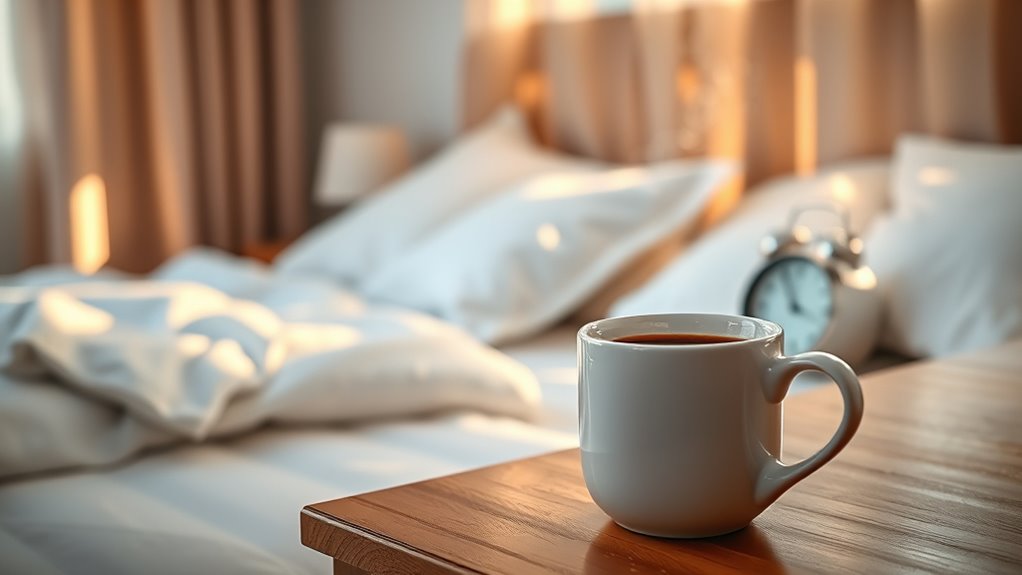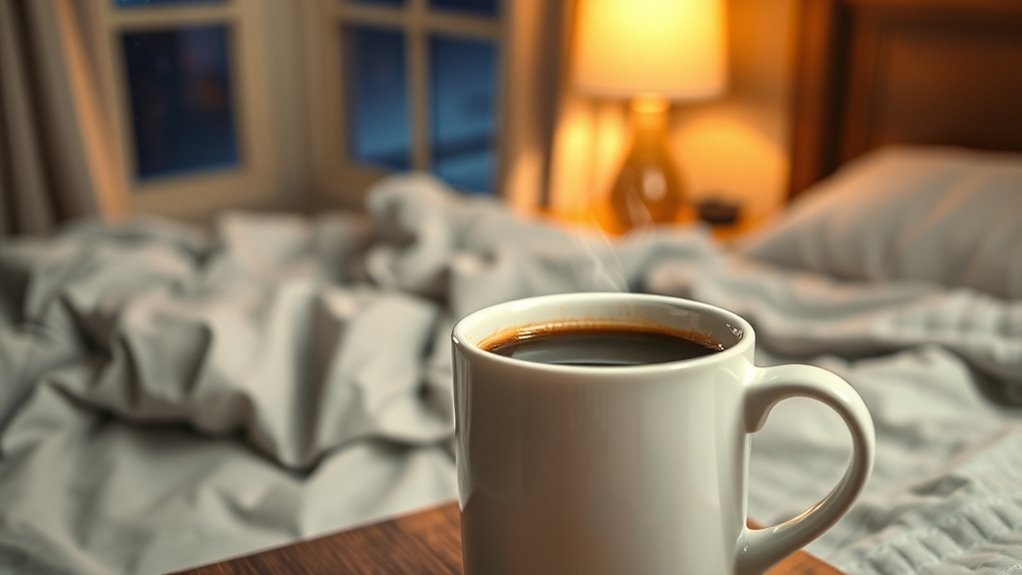Your caffeine intake timing greatly affects your sleep because caffeine stays active longer in some people, especially if they metabolize it slowly. Drinking coffee in the late afternoon or evening can block your adenosine receptors, making it harder to fall asleep, producing lighter, disrupted rest. If you want better sleep, it’s best to avoid caffeine at least six hours before bed. Continue exploring how managing your caffeine habits can improve your nightly rest.
Key Takeaways
- Drinking coffee late in the day can delay sleep onset and reduce sleep quality due to lingering caffeine effects.
- Caffeine blocks adenosine receptors, preventing sleepiness and disrupting natural sleep-wake cycles.
- Individual differences in caffeine metabolism determine how long caffeine affects sleep, with some experiencing longer-lasting effects.
- Limiting caffeine intake at least six hours before bedtime helps minimize sleep disturbances.
- Monitoring personal sleep patterns can help identify optimal caffeine timing for better rest.

Many people rely on coffee to start their day, but consuming it too late can interfere with sleep. Understanding how caffeine affects your body, especially through caffeine metabolism, is key to managing its impact on your rest. When you drink coffee, caffeine enters your bloodstream quickly and reaches your brain, blocking the adenosine receptors responsible for making you feel sleepy. The speed at which your body processes caffeine varies considerably from person to person, influenced by factors like genetics, age, and liver function. This process, known as caffeine metabolism, determines how long caffeine stays active in your system. If you have a fast metabolism, caffeine might clear out of your system within a few hours, but if your metabolism is slower, it can linger for much longer, increasing the risk of sleep disruption. Implementing natural techniques, such as consuming herbal teas or decaffeinated beverages in the evening, can help mitigate these effects.
When you consume coffee later in the day, especially in the afternoon or evening, you may not realize just how long caffeine remains in your system. For some, caffeine can stay active for six hours or more, meaning it’s still impacting your body when you’re trying to wind down. This lingering caffeine can interfere with your ability to fall asleep and reduce the quality of your rest. Sleep disruption caused by caffeine isn’t just about difficulty falling asleep; it can also lead to lighter sleep, more awakenings during the night, and less time spent in restorative sleep stages. Over time, this can accumulate to leave you feeling tired and groggy during the day, defeating the purpose of that morning coffee boost. Being aware of soil health and its influence on overall well-being can also remind us of the importance of managing our habits for better health.
To minimize sleep disruption, it’s important to pay attention to your caffeine metabolism and timing. If you notice that caffeine affects your sleep even hours after drinking it, try to cut off your coffee intake at least six hours before bedtime. Keep in mind that individual differences mean some people can tolerate caffeine later in the day without issues, while others are more sensitive. If you’re unsure, experiment by gradually shifting your last caffeine intake earlier and observe how it influences your sleep quality. Remember, it’s not just about the amount of caffeine but also about how long it stays active in your body. Being mindful of your caffeine metabolism and timing can help you enjoy your coffee without sacrificing restful, restorative sleep.
Frequently Asked Questions
Can Decaffeinated Coffee Affect Sleep Similarly to Regular Coffee?
Decaffeinated impact on sleep varies for each person, but generally, decaffeinated coffee is less likely to cause sleep disturbance compared to regular coffee. While it contains minimal caffeine, some traces might still linger, potentially affecting sensitive individuals. If you notice sleep issues after drinking decaf, it could be due to other factors or residual caffeine. Pay attention to your body’s response, and consider reducing intake if sleep quality declines.
How Does Caffeine Impact Sleep Quality Long-Term?
Caffeine’s long-term impact on your sleep quality is like a slow erosion, gradually wearing down your rest. Over time, caffeine tolerance develops, leading you to consume more to feel alert, which can worsen sleep deprivation. This cycle hampers your sleep cycles, reducing restorative REM sleep, and leaves you feeling drained. To protect your sleep, cut back gradually and limit caffeine intake, especially later in the day.
Are There Individual Differences in Caffeine Metabolism Affecting Sleep?
You might notice that caffeine affects your sleep differently than others do. This is because genetic factors influence your metabolic rates, meaning some people process caffeine faster or slower. If your metabolism is slower, caffeine stays in your system longer, disrupting your sleep more. Conversely, faster metabolisms clear caffeine quickly, minimizing sleep disturbances. Understanding your individual genetic factors can help you manage your caffeine intake to improve your sleep quality.
Does Caffeine Consumption Affect Dream Patterns or REM Sleep?
Think of caffeine as a disruptive conductor in your sleep symphony. It can silence REM sleep, leading to REM suppression, and affect your dream recall. When you consume caffeine late, it’s like hitting pause during your dream performance, making dreams less vivid or memorable. So, your caffeine intake influences not just your sleep quality but also how your dreams play out, leaving you with a less colorful dreamscape in the morning.
Can Caffeine Timing Influence Sleep in Shift Workers?
You can profoundly influence your sleep by managing caffeine timing during shift work. Caffeine scheduling helps reduce its stimulating effects during your sleep hours, making it easier to rest. If you avoid caffeine close to your sleep time, you’ll likely fall asleep faster and enjoy better quality sleep. Properly timed caffeine intake supports your circadian rhythm, helping you adapt better to irregular shift work hours and maintain overall health.
Conclusion
Remember, your caffeine habits can make or break your sleep. Think of each cup as a tiny ship setting sail—if you don’t time it right, it might never reach its peaceful harbor. So, plan your coffee intake wisely, especially in the hours before bedtime. By doing so, you’ll enjoy restful nights and wake up refreshed, ready to embrace each new dawn like a hero returning from a victorious quest. Your sleep deserves that kind of heroism.









